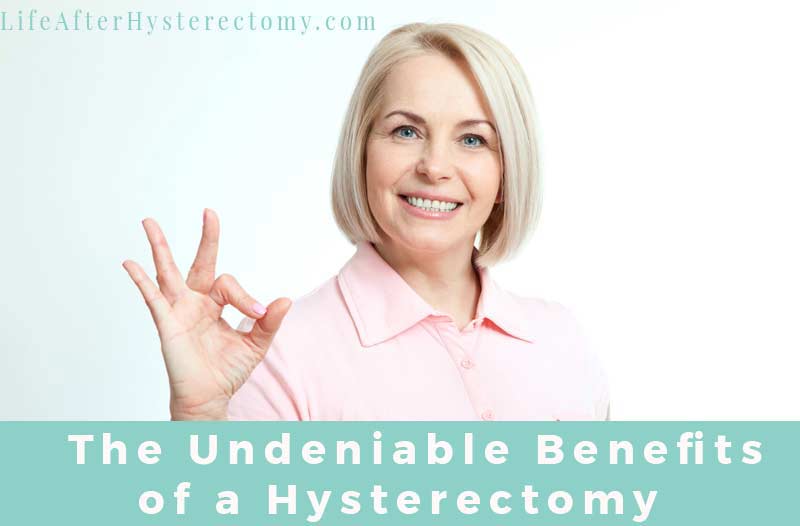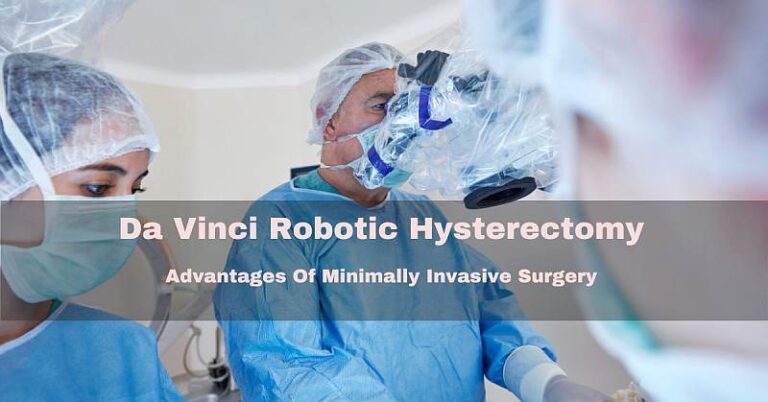The Undeniable Benefits of a Hysterectomy
This blog is reader-supported. When you buy through a link on our site, we earn a commission at no extra cost to you. Read more
The benefits of having a hysterectomy are obvious when it comes to things like cancer of the reproductive organs, but there are lots of other reasons why women may have a hysterectomy.

You may find it interesting to read that a hysterectomy can have other often surprising benefits for your health and well-being.
There are lots of pros and cons for women to consider. But in some instances, a woman can really benefit from having a hysterectomy.
Benefits of a hysterectomy for fibroids
For large fibroids, your doctor may suggest a hysterectomy as a way to relieve the symptoms, especially if they are causing a lot of bleeding.
A myomectomy can remove fibroids from the womb and is a good option if you still want to have children. However, not all fibroids can be treated through this procedure.
Even if they can, it is possible they come back again. A hysterectomy is a more permanent way to deal with fibroids. The benefits are that it provides relief for symptoms such as:
- Heavy and long-lasting periods
- Problems with emptying your bladder and frequent urination
- Pelvic or low back pain
- Pain during intercourse
Overall, removing the womb is probably the best way to make sure that fibroids do not develop again in the future.
Read more: When to have a hysterectomy for fibroids?
Benefits of hysterectomy for migraines
Many women experience debilitating migraines during their menstrual cycle. This often leads to the assumption that having a hysterectomy will automatically improve their quality of life. Surely this can be the case for some women, but it is not guaranteed.
In the hope that having a hysterectomy will encourage your migraine symptoms to disappear, they may do a trial treatment that brings about
In some cases, this helps women with their migraine symptoms. Consequently, it confirms the probability that removing the ovaries with or without a full hysterectomy will have the same effect more permanently.
Benefits of a hysterectomy after breast cancer
There is a risk that women who develop breast cancer may also develop cancer of the ovaries or uterus further down the line.
Research from Australia indicates that having a hysterectomy can increase survival chances by up to 30%, especially if it includes the removal of the ovaries.
There are some concerns that having a hysterectomy that still retains the ovaries can trigger other types of cancer in the future, but this is something to weigh up.
Benefits of a hysterectomy for prolapsed uterus
If a uterine prolapse has reached stage 3 or 4 and is either extending into the vagina or protruding out of it completely, it may be treated with a hysterectomy.
This will typically be a vaginal hysterectomy, although this is not necessarily the case.
Having a hysterectomy can reduce some of the issues associated with uterine prolapse like:
- Difficulties having a bowel movement.
- Problems during intercourse because of the protruding uterus.
- Heavy feeling or pulling in the pelvic area.
- Problems with urination (leaking or can’t empty the bladder).
A hysterectomy does not address the underlying problem, which is the lack of support for the reproductive organs. Oftentimes, vaginal repair surgery with
Benefits of hysterectomy for endometriosis
The misery of endometriosis can sometimes be improved, given that all endometrial tissue can be removed. Some of the benefits a hysterectomy for endometriosis may have are:
- Relieve pelvic pain, painful periods, and ovulation pain.
- End bladder problems
- Relieves bowel issues
- Improved sex life
- Ends heavy bleeding
As long as all of the endometrial tissue can be successfully removed, hysterectomy can be a solution for endometriosis.
Read more: Hysterectomy for endometriosis – Get all the facts before you decide.
Can You Choose to Have an Elective Hysterectomy?
Unless they are needed for life-saving emergencies, most hysterectomies are considered to be elective, given that you choose to have the procedure.
It is possible to request to have a hysterectomy, but only after other treatment options have been tried and deemed unsuccessful.
It is extremely unlikely that a doctor will agree to perform a hysterectomy to solve a particular health issue without trying different nonsurgical and other surgical procedures first.
This is because a hysterectomy is a life-altering surgery that is not without risks and can possibly have long-term complications.
In conclusion, a hysterectomy can potentially help various health conditions. Some of which don’t necessarily seem to have a strong link to the reproductive system on paper.
Unfortunately, not all women will experience improvement in symptoms after a hysterectomy. However, for many women, a hysterectomy deals with their problems and improves their quality of life.
We love it if you have a positive hysterectomy experience to share. You can do this in the comments below.
Reviewed by: Kimberly Langdon M.D. (OB/GYN)
Date reviewed: 19/3/2019




I’m getting a hysterectomy because of adenomyosis. Excision surgery for endometriosis. Ovaries removed because of PMDD and my appendix because of endo and inflammation.
I had my hysterectomy two weeks ago due to PMDD, so far I am Pmdd free, and feel like new.
I had a hysterectomy 4 weeks ago. I had gotten pregnant at age 43, and was eleven weeks along when it was discovered that the placenta had attached to my c-section scar, and the doctor was afraid of uterine rupture. Mine was a life saving emergency surgery, but it’s still a difficult thing for me to accept. It was just so sudden, and I feel like I still have a thousand questions. I feel like I was forced to get rid of my perfectly good uterus.
I had my hysterectomy in 1996, due to endometriosis. That is when I feel my life began!! I was 39 years old, and had been in pain most of those years. My ovaries were left so that I would not go through menopause.
I still read and try to understand why some people get this, and why doctors do not pay attention to what your body is clearly telling you. I do thank God for my ob/gyn, that finally listened. My problem was I had been going to male doctors, I finally went to a female doctor.
I had no idea that this (endo) could be so bad for some women. My heart goes out to the ones that still suffer.